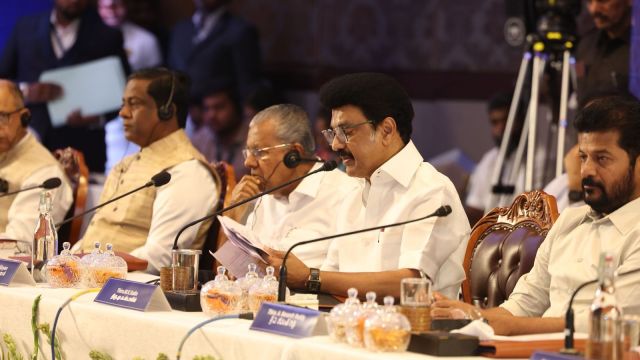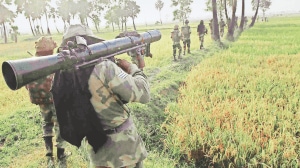Delimitation meet: Hindi belt Opp parties not on same page, TMC too stays away; BJP ally TDP silent
DMK chose not to invite INDIA parties from North, such as SP and RJD, and from Maharashtra like Sena (UBT) and NCP, most of whom are not opposed to delimitation.
 Tamil Nadu CM MK Stalin with Kerala CM P Vijayan and Telangana counterpart Revanth Reddy in Chennai on Saturday for a meeting on the Centre's proposed delimitation exercise. (Express Photo)
Tamil Nadu CM MK Stalin with Kerala CM P Vijayan and Telangana counterpart Revanth Reddy in Chennai on Saturday for a meeting on the Centre's proposed delimitation exercise. (Express Photo)The leadership of anti-BJP parties, including the Congress, from states in the South, Punjab and Odisha forged a broad coalition Saturday against the proposed delimitation exercise but the silence of the INDIA bloc parties from the Hindi belt and Maharashtra and the TMC’s decision to skip the conclave convened by DMK chief and Tamil Nadu Chief Minister M K Stalin signal that Opposition parties are not on the same page on the issue.
The states in the South, barring NDA constituent TDP-ruled Andhra Pradesh, have already voiced their concern that they may lose out on seats if population is retained as the sole criterion in redrawing and redistribution of Lok Sabha seats.
Delimitation of Lok Sabha seats is to happen post the Census after 2026. While Opposition parties in states in the South fear loss of seats, and in the process heft and influence, parties in the North have every reason to be happy.
The DMK, which convened the conclave, chose not to invite INDIA bloc parties from the northern belt – such as SP, RJD – and those from Maharashtra like the Shiv Sena (UBT) and NCP. The reason was obvious. Most of these parties are not opposed to delimitation but would not say so now. Simply put, they are not on the same page as the DMK on this issue.
Sources in these parties say they are waiting for the BJP-led Centre to open its delimitation cards before taking a view. The TMC, which was invited to the meeting by the DMK, believes issues like duplicate EPIC numbers are more important to it now given the fact that West Bengal is going to Assembly elections next year.
In the 1977 Lok Sabha, every MP in India represented on an average about 10.11 lakh people. While this number is not etched in stone, states in the North and West Bengal stand to gain in the delimitation exercise. For instance, Lok Sabha seats in West Bengal will go up from 42 to 66 even if 15 lakh is considered the baseline population. At 20 lakh, seats in West Bengal will go up to 50. The TMC is yet to announce its stand on the issue and sources in the party said the conclave is largely a “gathering of southern parties”.
When contacted, leaders of the SP too said the party is yet to discuss the issue. “Our focus is on the 2027 Assembly elections,” a senior leader said. But behind the reluctance to take a position is the fact that the SP cannot be seen as opposing the move since UP stands to gain the most in terms of increase in seats in delimitation.
If the 10.11 lakh average population formula is repeated, UP (including Uttarakhand) will end up having 250 seats compared to its present share of 85 in Parliament. Seats in Bihar and Jharkhand would increase from 54 to 169 – a three-time increase. Similarly, Rajasthan’s would increase from 25 to 82.
Tamil Nadu’s share would increase too but from 39 to only 76, less than double. So would Kerala’s, from 20 to 36. However, since the new Parliament has only 888 seats, this formula is unlikely to be retained. If the population in each constituency is doubled at 20 lakh to give the Parliament 707 seats as compared to 543 now, the southern states would be at severe disadvantage. Under this formula, Tamil Nadu’s seats would remain the same, 39. But Kerala would lose two seats and end up with 18.
Conversely, UP (including Uttarakhand) would still register an increase at 126 seats as would Bihar and Jharkhand at 85 seats. Even at an average population of 15 lakh per constituency, which would take Parliamentary seats to 942, southern states would be at disadvantage as compared to northern states. This formula will give Tamil Nadu 52 seats and Kerala 24 seats. But UP (along with Uttarakhand) will get 168 seats and Bihar and Jharkhand will get 114 seats.
The Congress, with a pan-Indian footprint, too is cautious. Of the three states that the Congress is in government now, two are in the South. And it hopes to stage a comeback in Kerala in Assembly elections next year. In Tamil Nadu, it is firmly with the DMK-led alliance. Of its 99 Lok Sabha seats, 40 are from four southern states.
INDIA bloc partners RJD and SP do not want to be seen opposing a delimitation move that guarantees their states — Bihar and UP — more seats in Parliament. Especially ahead of Assembly polls.
The Congress high command had echoed the concerns of the states in the South some days ago saying that states which showed early success in family planning and reducing total fertility rates stand to be “penalised”. The RJD said it was not in favour of kicking the delimitation can down the road but believes population should not be the sole criterion.
Speaking to The Indian Express, RJD Rajya Sabha MP Manoj K Jha said he would not speak as a typical north Indian politician who is happy that the North will have 100 more seats.
“That will not be in the interest of the nation. Rather than pushing delimitation for 30 years, I believe that… after the Census is held… there should be a committed session of Parliament to discuss what should be the standard of the proposed delimitation which should include not only just population but other performance also… After the Census, the delimitation should take place… but we should first have a session of Parliament dedicated to discussing the modalities,” he said.
And it is not just the INDIA bloc. The TDP, a key constituent of the NDA, too has been silent on the issue of delimitation. Sources in the TDP said the state too has concerns but would not like to air it openly now.
The TDP was invited by the DMK to the meeting but it chose to stay away and so did Pawan Kalyan’s JSP, another member of the NDA. The BJD, on the other hand, attended. Sources in the party said the party, which was ousted by the BJP from power in Odisha, takes independent positions depending on issues.



- 01
- 02
- 03
- 04
- 05




























